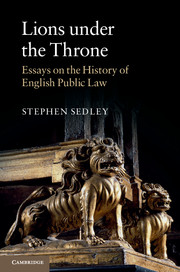Book contents
- Frontmatter
- Epigraph
- Dedication
- Contents
- Preface
- Introduction
- Part I Histories
- 1 Lions in winter: public law in the twentieth century
- 2 The dark satanic mills: the Victorian state
- 3 New corn from old fields: the Hanoverian harvest
- 4 Parchment in the fire: public law in the Interregnum
- 5 The future of public law
- Part II Themes
- Index
5 - The future of public law
from Part I - Histories
Published online by Cambridge University Press: 05 November 2015
- Frontmatter
- Epigraph
- Dedication
- Contents
- Preface
- Introduction
- Part I Histories
- 1 Lions in winter: public law in the twentieth century
- 2 The dark satanic mills: the Victorian state
- 3 New corn from old fields: the Hanoverian harvest
- 4 Parchment in the fire: public law in the Interregnum
- 5 The future of public law
- Part II Themes
- Index
Summary
This chapter reflects on some of the demands and strictures placed on modern public law. It then looks at two areas of potential development: the control of policy and the growth of a new paradigm of constitutionalism.
The Judge Over Your Shoulder
In his speech at the annual dinner of the Administrative Law Bar Association in 1987, the guest of honour, Sir John Donaldson MR, read out, to gales of laughter, the final checklist in a newly produced handbook for civil servants on how to avoid judicial review, entitled The Judge Over Your Shoulder. Before signing off a decision, the handbook advised, civil servants would do well to ask themselves such questions as:
Are you exercising the power for the purpose for which it was given?
Are you acting for the right reasons?
Have you made up your mind in advance …?
Do you propose to act in a way which a court may regard as … so unreasonable that it is likely to find against you?
Nobody had told the Master of the Rolls that the author of the handbook, the principal assistant Treasury Solicitor, Robert Ricks, was sitting a few feet away from him. Ricks took the laughter in good part; but a quarter of a century later, it may be his successors who are going to get the last laugh. The self-confidence with which the legal profession entered the 1990s, reflected both in the anxious tone of the civil service's handbook and in the amusement it generated among administrative lawyers, are no longer part of the landscape.
In the intervening years The Judge Over Your Shoulder has run through a series of editions, each considerably longer than the last. It now has to take in human rights, devolution and a growing range of EU law. But it remains laudably focused: its purpose, says the preface,
is not “How to survive judicial review” but rather to inform and improve the quality of administrative decision-making.
- Type
- Chapter
- Information
- Lions under the ThroneEssays on the History of English Public Law, pp. 107 - 120Publisher: Cambridge University PressPrint publication year: 2015



